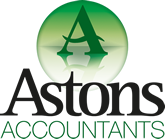Value Added Tax (VAT)
Home / Value Added Tax (VAT)
Value Added Tax (VAT)
- All businesses must register for VAT, if trading in a relevant activity, and turnover exceeds the relevant level.
- However, all business can register (voluntarily) for VAT if they are trading in a taxable activity, and turnover is below the current threshold, but registration may be worthwhile or beneficial in some way.
If business income reaches the relevant threshold, over the applicable timescale, the business has 30 days to register for VAT. Astons Accountants can help by applying for a VAT registration for you, and discussing the information which needs to be recorded on the application form.
In a situation where business income is below the relevant threshold, the business may benefit from VAT registration, in any one of a number of ways, depending on your situation and circumstances.
The decision will be affected by the level of income, the types of sales, the types of customer and the level of expenses subject to VAT. Running a limited company does not necessarily mean you need to register for VAT, and being a self employed sole trader does not always mean that a VAT registration is not required. It is best to talk this situation through with Astons Accountants so that you feel comfortable that you understand whether VAT is relevant for your business.
Special Schemes
There are various “special schemes” available for certain types of business and there is a special “VAT Flat Rate Scheme” which traders can choose to use, if they wish.
In many instances, you can choose whether you account for VAT on invoices going out and coming in (the ‘normal’ method) or on cash coming
in and going out (called ‘VAT cash accounting’) – different schemes are beneficial to different types of business.
Whichever type of set-up you have, Astons Accountants are here to help with VAT returns.

